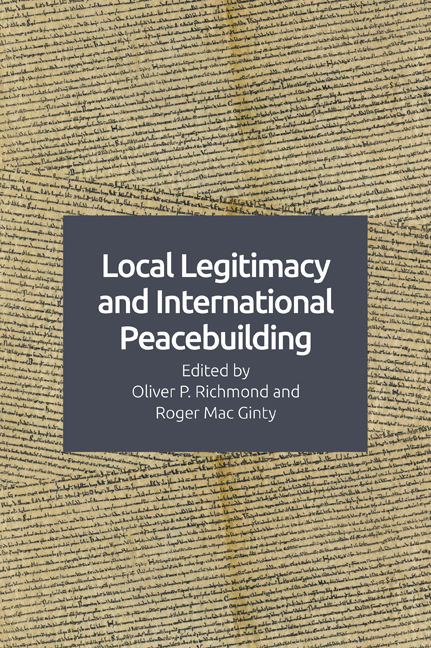Book contents
- Frontmatter
- Contents
- Contributors
- Foreword: The Riddle of Legitimacy
- Introduction: Legitimacy and Peace in the Age of Intervention
- One The Hybridization of Legitimacy in Processes of Peace Formation: the Bougainville Case
- Two International Intervention and Relational Legitimacy
- Three From a Divisive Peace Agreement to a Legitimate Peace in Colombia
- Four Banners, Billy Clubs and Boomerangs: Leveraging and Counter-Leveraging Legitimacy in the Occupied Palestinian Territory
- Five Peacebuilding as a Self-Legitimising System: The Case of Bosnia-Herzegovina
- Six ‘We Are There at Their Invitation’: Struggles for Legitimacy during the US Coalition Invasion–Occupation of Iraq
- Seven Inclusion and Performance as Sources of Legitimacy – the UN Mediation on Syria
- Eight Agonisation to Re-Legitimise the Postcolonial, Post-Conflict Somaliland
- Nine Third Party Legitimacy and International Mediation: Peacemaking through Pan-Africanism in Sudan
- Ten Post-War Legitimacy: A Framework on Relational Agency in Peacebuilding
- Eleven Legitimacy in Lebanon
- Conclusion: Peacebuilding and Legitimacy: Some Concluding Thoughts
- Index
Ten - Post-War Legitimacy: A Framework on Relational Agency in Peacebuilding
Published online by Cambridge University Press: 17 November 2020
- Frontmatter
- Contents
- Contributors
- Foreword: The Riddle of Legitimacy
- Introduction: Legitimacy and Peace in the Age of Intervention
- One The Hybridization of Legitimacy in Processes of Peace Formation: the Bougainville Case
- Two International Intervention and Relational Legitimacy
- Three From a Divisive Peace Agreement to a Legitimate Peace in Colombia
- Four Banners, Billy Clubs and Boomerangs: Leveraging and Counter-Leveraging Legitimacy in the Occupied Palestinian Territory
- Five Peacebuilding as a Self-Legitimising System: The Case of Bosnia-Herzegovina
- Six ‘We Are There at Their Invitation’: Struggles for Legitimacy during the US Coalition Invasion–Occupation of Iraq
- Seven Inclusion and Performance as Sources of Legitimacy – the UN Mediation on Syria
- Eight Agonisation to Re-Legitimise the Postcolonial, Post-Conflict Somaliland
- Nine Third Party Legitimacy and International Mediation: Peacemaking through Pan-Africanism in Sudan
- Ten Post-War Legitimacy: A Framework on Relational Agency in Peacebuilding
- Eleven Legitimacy in Lebanon
- Conclusion: Peacebuilding and Legitimacy: Some Concluding Thoughts
- Index
Summary
Introduction
There is increasing interest in the role of legitimacy as an indicator of social and political stability in post-war societies. In this chapter we provide an analytical framework to examine peacebuilding interventions from a legitimacy perspective. The relationship between the state and society is conceived as crucial to international peacebuilding interventions seeking to assist conflict-torn countries toward a self-sustaining peace – or a situation where external support is unnecessary. The literature on peacebuilding primarily has discussed the importance of legitimacy of peacebuilding interventions. However, we argue that contemporary peacebuilding interventions and the scholarly assessments of them have largely overlooked the relationship between the domestic actors involved in, and affected by, the conflict.
Instead of focusing on the principal purpose of peacebuilding processes, which is to build sustainable peace within a country, peacebuilding interventions deal with legitimacy as a tool to justify the peacebuilding agenda and approaches of international actors. The international quest for legitimacy has paradoxically redirected attention away from addressing the important challenge facing domestic peacebuilding processes, namely the peaceful relationship between the domestic state and society. We conceive of peacebuilding as founded in the relational agency between politics and society, i.e. between state and non-state actors (both military and civilian). We define peacebuilding as the process where in a post-war situation the structural-normative setup of the state in relation to society becomes renegotiated through the interactions of domestic state and non-state actors with, or without, the involvement of international or other external actors. We maintain that perceived legitimacy of the relationship between the domestic state and society constitutes the foundation of the social and political post-war order.
In this chapter we begin by discussing the existing peacebuilding literature and practices, before articulating our framework on legitimacy, actors and relational agency in peacebuilding. Thereafter, we present an extended application of the framework on two recent peacebuilding processes. The chapter concludes by stressing the necessity to refocus peacebuilding interventions to the relational dynamics and legitimacy of domestic state and non-state actors.
From liberal peacebuilding to broader peacebuilding
In the early post-Cold War period, the UN Security Council, with newfound confidence, authorised an unparalleled number of multilateral military operations broadly referred to as peace operations to intervene in internal armed conflicts. Concurrently, the UN's ‘Agenda for Peace’ introduced the concept of peacebuilding, which had salient impact on the discourse and practices of international intervention.
- Type
- Chapter
- Information
- Local Legitimacy and International Peace Intervention , pp. 215 - 239Publisher: Edinburgh University PressPrint publication year: 2020

